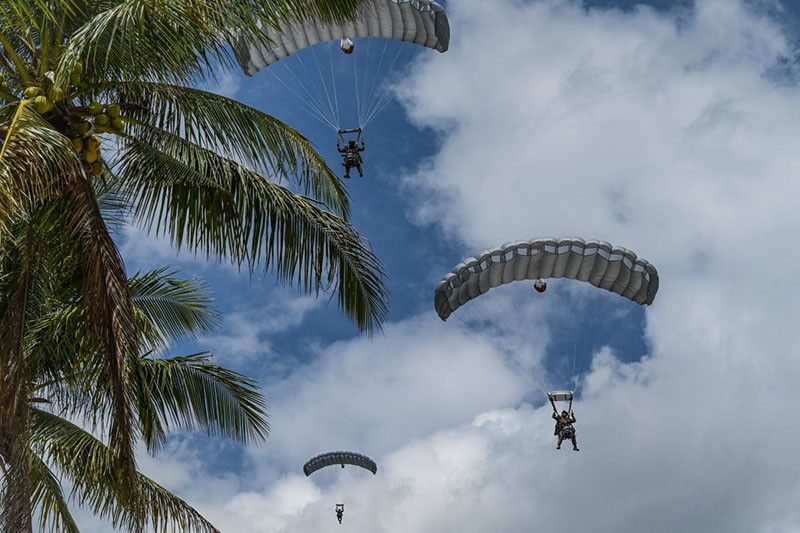Balikatan exercises: A collective pursuit of maritime security

The developments in the West Philippine Sea can be tracked in two ways. The first is how the Philippines is confronted with emerging risks brought on by increasingly aggressive behavior of irresponsible actors. The second way is how the country has steadily affirmed its rights through external defense capacity building in accordance with the rule of law.
Geopolitical confrontation, masked through gray zone operations, has become the norm in the West Philippine Sea. The WPS has emerged as a regional flashpoint where the country is confronted with various bullying tactics by its northern neighbor with hegemonic ambitions.
An example of this is China’s continued use of high-pressure water cannons against Filipino vessels that are conducting legal activities within the Philippine territory.
On April 30, the country experienced the most aggressive assault on its civilian ships engaged in a routine and regular humanitarian mission in Bajo de Masinloc. Chinese Coast Guard vessels repeatedly blasted water cannons against the Philippine Coast Guard’s BRP Bagacay and the Bureau of Fisheries and Aquatic Resources’ BRP Datu Bankaw.
The assault resulted in over P2 million in damages, including damage to the ships’ communication and navigation systems, and structural damage on the railing and canopy. Chinese vessels recklessly rammed into Filipino vessels, gravely endangering the lives of those onboard.
These acts of violence starkly contradict the foundational tenets of the firmly established rules-based international order. The incident reveals the true colors of the attackers: they are reckless and irresponsible. It further exposes China’s blatant disregard of its obligations under international law and its disrespect for a legally binding arbitral award.
Against this backdrop, the Philippines has remained resolute in asserting its rights in the West Philippine Sea. The country steadily builds its external defense capabilities through the operationalization of the Comprehensive Archipelagic Defense Concept. This strategy employs a whole-of-government approach to secure the country’s sea lanes and maritime features against aggressors.
The Philippines has also strategically implemented a whole-of-society approach in its fight in the West Philippine Sea. Civilians are actively taking part as demonstrated by the announcement of the second civilian-led mission to Bajo de Masinloc this month.
With the primary objective of supporting the government’s efforts of securing our waters, more than 100 boats will sail to the shoal to install buoys and deliver essential supplies to Filipino fishermen in the area.
Moreover, the country is leveraging its relations with like-minded states who share the same respect for the rule of law. The Philippines is maximizing its engagements with like-minded partners as exemplified by the 39th Balikatan Exercises between the Philippines and the United States.
It is a concrete illustration of the strength of the alliance and the United States’ ironclad commitment to the defense of the Philippines.
Encompassing several critical areas including external defense operations, cyber defense, counterterrorism, humanitarian assistance and disaster response, and interagency capacity-building, this year’s iteration marks the most extensive joint training in the history of the exercises.
The Balikatan exercises serve to build collective deterrence against attempts to unilaterally alter the status quo. It illustrates the international community’s united front in ensuring peace, security, and stability in the Indo-Pacific.
Participating as observers in this concerted effort include like-minded countries namely Brunei, Canada, Germany, Great Britain, India, Indonesia, Japan, Malaysia, New Zealand, Republic of Korea, Singapore, Thailand and Vietnam. France is also participating for the first time in Balikatan’s history. The participation of these countries represents solidarity in the Indo-Pacific.
It is also the first time that civilian government agencies such as the Philippine Coast Guard, Philippine National Police, Department of Information and Communications Technology, and the Office of Civil Defense, are participating. This goes to show that concern for the West Philippine Sea is not just confined in the ranks of the military, but among civilians as well.
As part of the collective and rigorous efforts to ensure maritime security, the Philippines, United States and France also held the inaugural Multilateral Maritime Exercise in Palawan.
The Armed Forces of the Philippines, United States Indo-Pacific Command, and the French Navy simulated gunnery exercises, cross-deck operations, detect and engage, and photo exercises. This multilateral exercise provided an avenue for the three countries to promote interoperability and enhance maritime capabilities.
The Balikatan exercises send a message that is loud and clear: that the Philippines is not alone in its pursuit of safeguarding its territory and in its commitment to a free and open Indo-Pacific.
The country, being on the right side of history and legally backed by international law, is supported by friends and partners who are determined to stand firmly united in the face of an adversary.
The advancement of security ties is vital in the face of an increasingly evolving security landscape. It is especially critical as the intensity and regularity of Chinese aggression continue to grow.
The magnitude of this year’s exercises shows the value that the international community places on bolstering security ties with the Philippines. It further solidifies the Philippine’s commitment as a strategic security partner in the Indo-Pacific.
While the tensions in the West Philippine Sea present risks to maritime security and regional stability, it is also an opportune moment for the Philippines. Now it has the chance to present itself as a strong and reliable partner in the region.
The challenge now is for the Philippines to sustain this momentum of asserting its sovereignty and territorial integrity to effectively perform its duty of protecting Filipinos at sea, and productively exercise its rights to explore and use its marine resources in the West Philippine Sea.
Katrina Guerrero is a program and research manager at think tank Stratbase ADR Institute.
- Latest




























